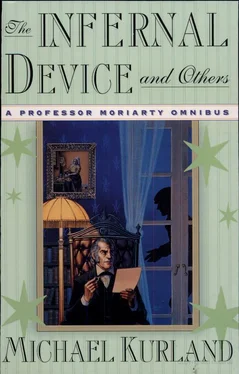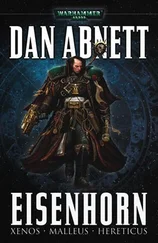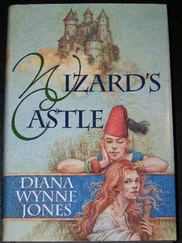"What sort of sense?" Jameson of the Daily Telegraph demanded.
"Lord East creates all this excitement, all this preparation, all this display, to draw attention to the treasure train," von Hertzog explained. "But the real treasure is sent otherwise. A clever man, Lord East."
Barnett nodded. "I'll up it to ten quid," he said. "Any takers? Ten quid says those boxes are as empty as an editor's heart."
"That's nonsense!" Inglestone said. "It certainly doesn't make any sense that I can see. Do you know what you're talking about, Barnett?"
The second chest was now in place. "Ten quid says I do," Barnett said.
"Come on, Barnett," Jameson said. "Don't try to make money on your friends. If you know something, spill it. Don't just sit there looking smug."
The cart with the third chest on it was being pushed up onto the loading platform. "Easy enough to check," Barnett said. "Any takers? Ten quid; easy money."
"How would you establish the contents of the chests?" von Hertzog asked.
"Open one," Barnett said.
"You're on!" Inglestone said, coming to a decision. "Ten pounds says that you're mistaken; that those chests are, indeed, full of the pieces in the Lord East Collection. But understand that this wager has nothing to do with the fourteen bob you owe me."
"Fair enough," Barnett said. "You can deduct it from my winnings. Well, shall we go find out? His lordship can't object to a reasonable request to open one of the chests. We'll all promise not to touch; won't we, boys?"
Now that the suggestion had been advanced, the reporters were unable to leave it alone. It became imperative to them to discover whether a possibility that none of them had even considered five minutes ago, that was unlikely in the extreme, that was actually none of their business, was true. In a body they left the grandstand and advanced toward the loading dock, the treasure chest, the goods wagon, and Lord East.
The four plainclothes policemen who were guarding the grandstand moved to stop the cluster of them as they advanced. "Gentlemen, gentlemen, please!" one of them cried, opening his arms wide, as if to encircle the group himself. " 'Ere now, what's this?" a second barked, running around to the front of the group. The other two also raced around to the front to place themselves uncertainly between the reporters and the platform.
Lord East heard the disturbance and turned to see the cluster of correspondents advancing on him. For a second he looked nonplussed, but then he gathered himself and guided his horse over to the group, placing himself and his horse between the reporters and the platform. "You gentlemen were requested to remain on the grandstand," he said sternly. "You must realize that we cannot compromise our security arrangements, even to oblige the press. Please return immediately whence you came."
The third chest was now inside the goods wagon, placed carefully on its supporting frame, and the Indian carters were emerging from the wagon as the fourth chest was pulled up in its cart. "If you don't mind, my lord," Barnett called up to him, "we'd like to see inside that box."
"Box?" Lord East looked uncertain for a moment. "You mean the treasure chest, sir?"
"Yes, my lord," Higgins, of the Pall Mall Gazette, called. "There seems to be some doubt as to whether the treasure is actually in the chests, or whether this is merely a ruse."
"A ruse, gentlemen?" Lord East looked shocked. He had just been accused of doing something un-British.
"The suggestion is, my lord," Inglestone said, "ridiculous as it sounds, that you have spirited the treasure away by some alternate means, while encouraging us to believe that it is still in those chests. Thus supposedly foiling possible criminal attempts upon the collection."
Lord East considered for a second. "And just why should I do that?" he asked. "The treasure is quite safe where it is. Certainly safer than any other place I could put it. I do not like these devious methods you speak of, nor do I resort to them. They are unnecessary."
"Then, my lord, the treasure is, indeed, in the chests?" Inglestone asked, looking inordinately pleased. "You affirm that?"
"There is my seal," Lord East said, pointing with his riding crop to the lid of the fourth chest, now being inserted into the goods wagon. He indicated the strip of ribbon that went across the lid's opening, sealed above and below. "It has not been broken."
"You will permit us to check?" von Hertzog asked.
"I most certainly will not!" Lord East said sharply. He waved the chest on into the wagon. "Gentlemen, this is outrageous! How dare you question me! The chest will be opened at the Royal Albert Museum, in the presence of a representative of her imperial majesty, and not a jot before. Please return to your seats."
The reporters, muttering uncertainly, returned to the grandstand. Barnett watched as Lord East checked the inside of the goods wagon and then ordered it closed and sealed from the outside.
Barnett's part of the job, whatever it had accomplished, was done. Now there was nothing to do but wait for the train that would take Moriarty to Hampermire Station and himself through to London. How the little act he had just put on would further the cause, he didn't know, and at the moment he didn't care. Somewhere in London, Cecily Perrine had disappeared; somewhere in London she was at this very moment. In what state she was, Barnett did not care to speculate. How he would find her, he had no idea. But if she was still alive, find her he would.
The sun was coming up, and the area outside the limelight was just beginning to be visible. Moriarty and Barnett left the grandstand and returned to the hotel. There was a telegram waiting for Moriarty when they arrived. He opened it and read it in a second. "Nothing," he said. "Sorry, Barnett. No trace of the lady yet."
"I'll find her," Barnett said.
"Of course you will," Moriarty told him.
TWENTY — ALWAYS DARKEST
I had a dream, which was not all a dream.
The bright sun was extinguished, and the stars
Did wander darkling in the eternal space,
Rayless, and pathless, and the icy Earth
Swung blind and blackening in the moonless air;
Morn came and went — and came, and brought no day…
— George Gordon, Lord Byron
Cecily Perrine awoke. Slowly, dimly, her awareness returned, and she was amazed to realize that she had been asleep. She had no idea how long she had slept; there was no way to mark the passage of time in her pitch-black surroundings. She rose from the ticking full of dank straw that was her mattress on the cold stone floor, and felt her way around the smooth stone walls. She did not know what she hoped to find, and in any case her groping fingers encountered nothing but damp stone. The cell she was in was approximately six feet square, and higher than her fingers could reach with her arms fully extended. It contained the straw-filled ticking, a chamber pot, and Cecily. The door in the corner of one wall was no more than a foot wide and four feet high, and held neither a peephole nor a doorknob.
She was not sure how, or why, she had arrived where she was. She remembered leaving the Hope mansion and walking toward her carriage. She had passed an alley where the Count d'Hiver was engaged in earnest conversation with some tall man. She remembered wondering who the man was, and where he had sprung from at such an hour. Then, on an idle whim, she had turned to hurry back to the mansion; she had thought of an unimportant question she wanted to put to Mr. Holmes. It would wait, but after all, she was there now. Rapid footsteps had sounded behind her, and a large, powerful man had grabbed her from behind. She had instinctively started to cry out, but her assailant had instantly clamped one great hand over her mouth, cutting her scream to no more than a loud gasp. He had then carried her a short distance, where some other person draped a sweet-smelling rag across her face. It must have been dosed with chloroform or some similar substance, for the next thing Cecily knew she was in this chamber.
Читать дальше












